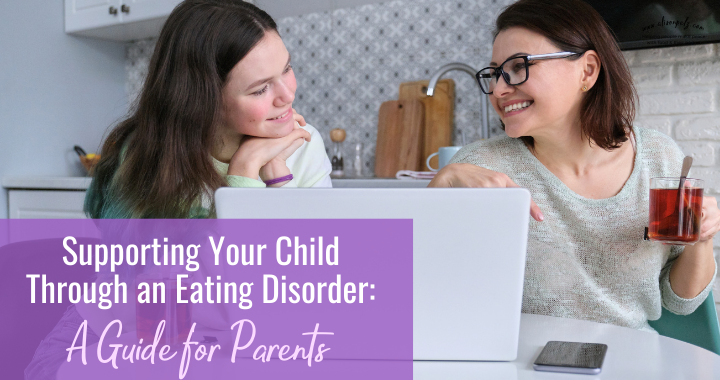Feeling overwhelmed, frightened, and unsure of how to help when your teen is struggling with an eating disorder is a common and natural experience for parents. And while eating disorders are complex and often misunderstood, with the right resources and support, recovery is possible for your teen. And as a parent, you play a crucial role in your teen’s healing journey.
Below you can find compassionate guidance as well as therapist recommended resources to help you support your teen through their eating disorder recovery effectively.
Start With Understanding:
Eating disorders are complex, but that doesn’t mean they are unknowable. Education is one of the most powerful tools you have at your disposal, not only to help you find effective methods of support, but also to help expand your understanding of what causes and may impact eating disorders, so you can give informed care to your teen–rather than having to rely on guess work and risk causing harm. Understanding the nature of eating disorders and their impact on both physical and mental health can demystify the illness and empower you to provide informed support to your teen.
Here are some highly recommended resources to deepen your knowledge and help you in supporting your child:
When Your Teen Has an Eating Disorder by Lauren Muhlheim:
This book provides practical advice for parents navigating their child’s eating disorder, offering evidence-based strategies rooted in Family-Based Treatment (FBT) in a non-clinical manner so they’re accessible to the non-clinical reader. Muhlheim is the founder of Eating Disorder Therapy LA, an outpatient treatment center, has trained many clinicians and is a frequent speaker at eating disorder trainings and conferences. You can read my full review of this book, and why I consider it a must read here.
Sick Enough: A Guide to the Medical Complications of Eating Disorders by Jennifer Gaudiani:
Dr. Gaudiani’s offers a compassionate exploration of the medical side of eating disorders throughout Sick Enough, helping parents understand the seriousness of eating disorders and how to advocate for their child’s car by breaking down the impact of dietary restriction on your children’s bodies and brains, providing descriptions of common medical problems associated with eating disorders, as well as common co-occurring medical issues that complicate diagnosis and treatment.
Dr. Gaudiani is a board certified-internal medicine doctor who specializes in the treatment of eating disorders, as well as the founder of the Gaudiani Clinic: an outpatient medical practice specializing in the treatment of eating disorders, and a highly respected physician in the eating disorder community.
How to Nourish Your Child Through an Eating Disorder by Casey Crosbie and Wendy Sterling.
Authors Crosbie and Sterling are registered dietitians who specialize in the treatment of eating disorders. How to Nourish Your Child focuses on the Plate-by-Plate approach, a resource which gives parents actionable steps to help their child restore nutrition-without counting calories or macros.This book helps parents answer the question, “what and how much should I be feeding my child,” especially for parents of teens with eating disorders.
Anorexia and Other Eating Disorders: How to Help Your Child Eat Well and Be Well By Eva Musby.
Eva Musby’s lived experience as parent supporting a teen daughter through in an eating disorder makes her book a wonderful resource. She provides invaluable tools for parents, including guidance on communicating with compassion, handling mealtime challenges, and navigating the emotional toll of supporting a child with an eating disorder. You can visit her website for free resources and updates.
Lean on Community
Try to remember that you are not alone in this journey. Many parents have walked this path and found solace, guidance, and strength in connecting with community and many who have found healing in connecting with others who understand your struggles. Some places to start:
FEAST-ED.org:
F.E.A.S.T-ED (Families Empowered and Supporting Treatment of Eating Disorders) is an organization that offers resources specifically for parents and caregivers of children with eating disorders. Their community of parents provides support and shared experiences, and resources like forums, educational materials, and a library of researched back information
The Alliance for Eating Disorders Awareness:
This organization offers support groups, treatment referrals, and education for families. Their resources can help you find professionals and programs tailored to your child’s needs.
Practical Tips for Supporting Your Child Effectively:
- Practice Patience and Empathy: Recovery is a marathon, not a sprint. Validate your child’s feelings, even when you don’t fully understand them. If you want to learn more about why validation is important (and how to do it) in your child’s recovery I highly recommend this video on emotional coaching.
- Focus on Nourishment, Not Blame: Approach meals and food with a goal of healing and restoration, rather than criticism or punishment.
- Prioritize Your Own Well-Being: Supporting a child through an eating disorder is emotionally taxing. Seek support for yourself, whether through therapy, parent groups, or trusted friends.
- Communicate Openly With Your Child: Foster an environment where your child feels safe to share their thoughts and feelings without fear of judgment.
A Final Word
As daunting as this journey may seem, remember that recovery is possible. By equipping yourself with knowledge, support, and compassion, you can help your child reclaim their health and happiness. Keep taking it one step at a time, and don’t hesitate to reach out for help when you need it. You are not alone in this fight—and neither is your child.
